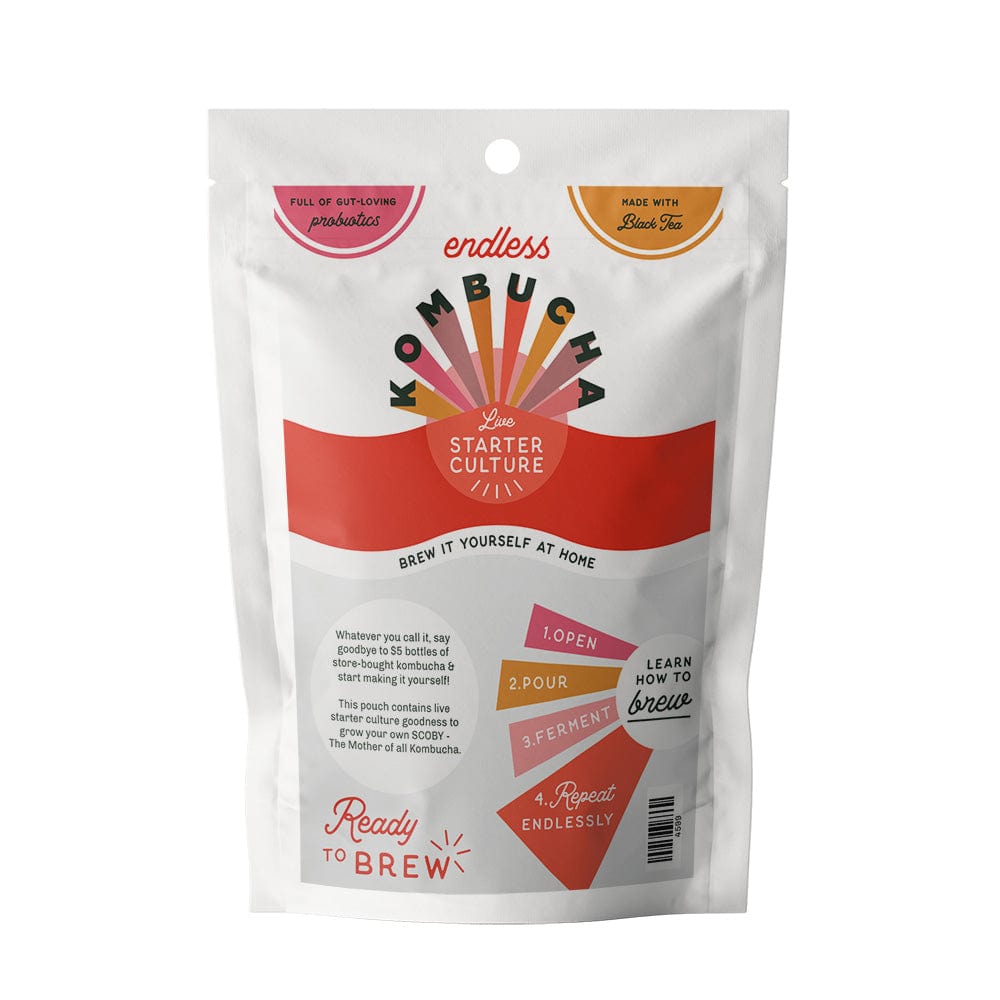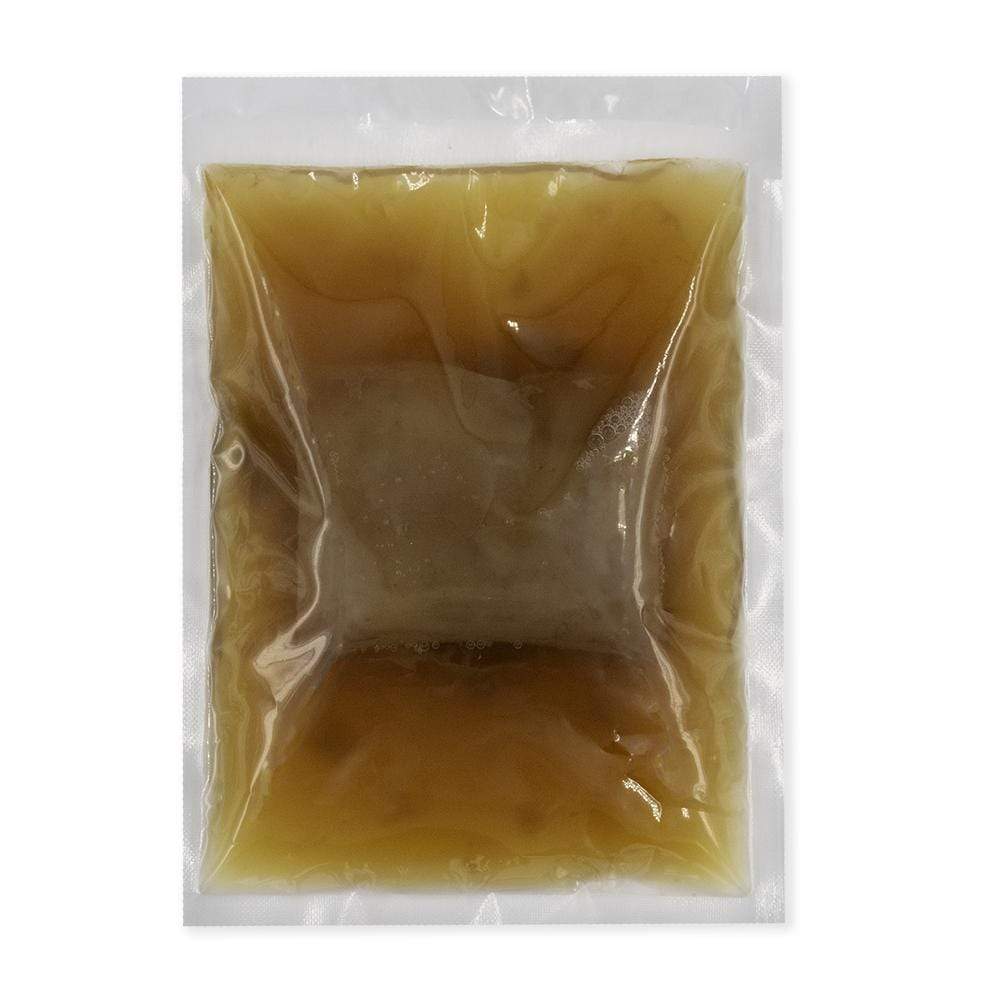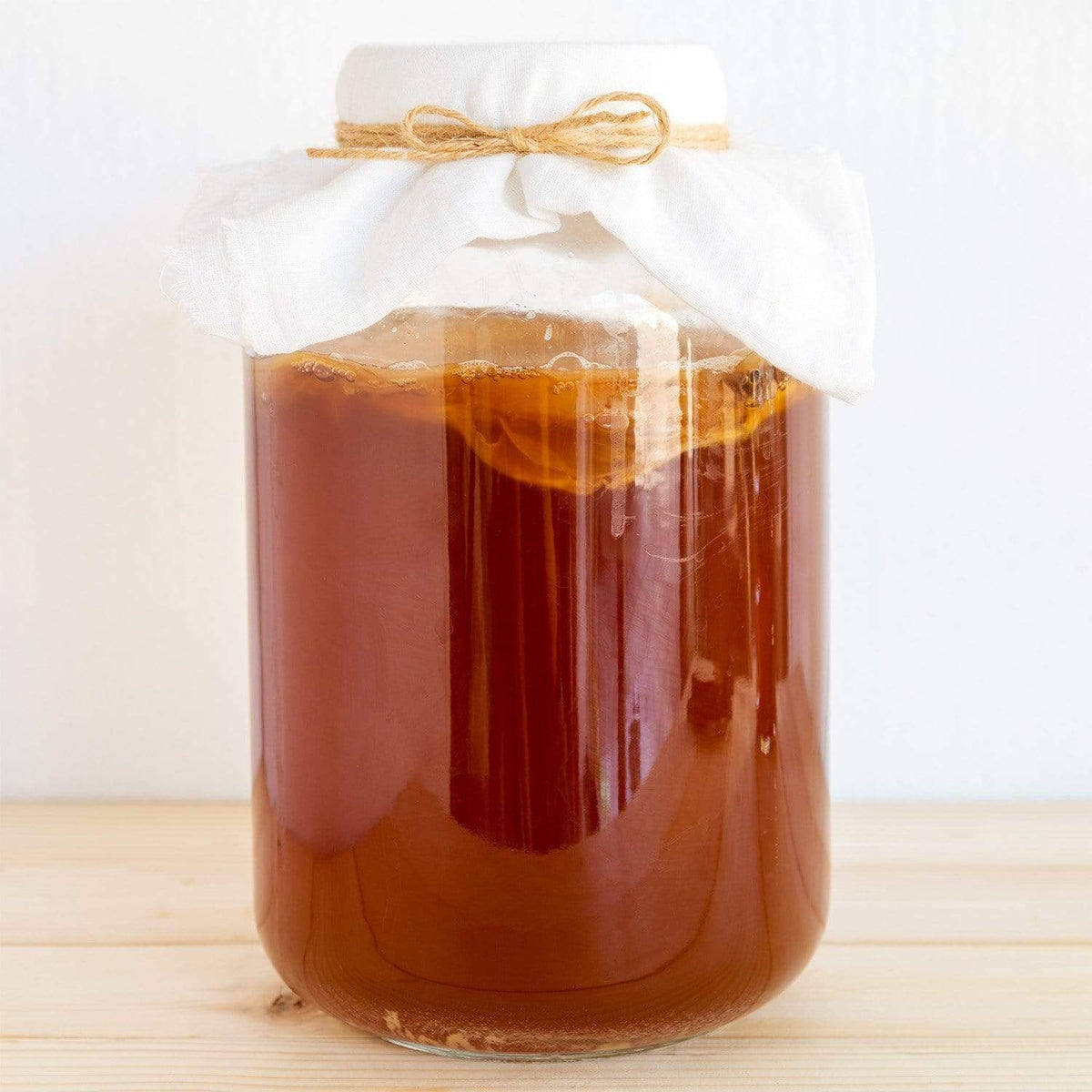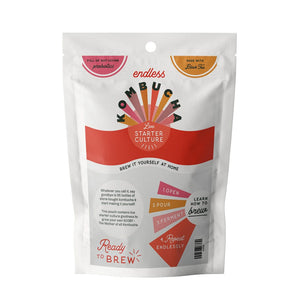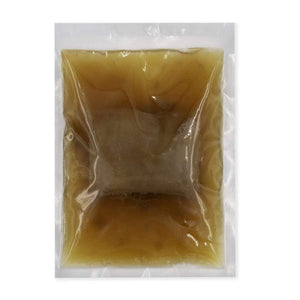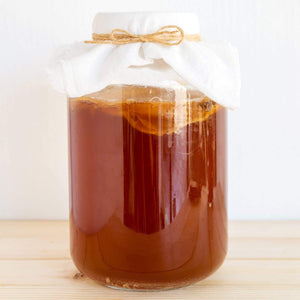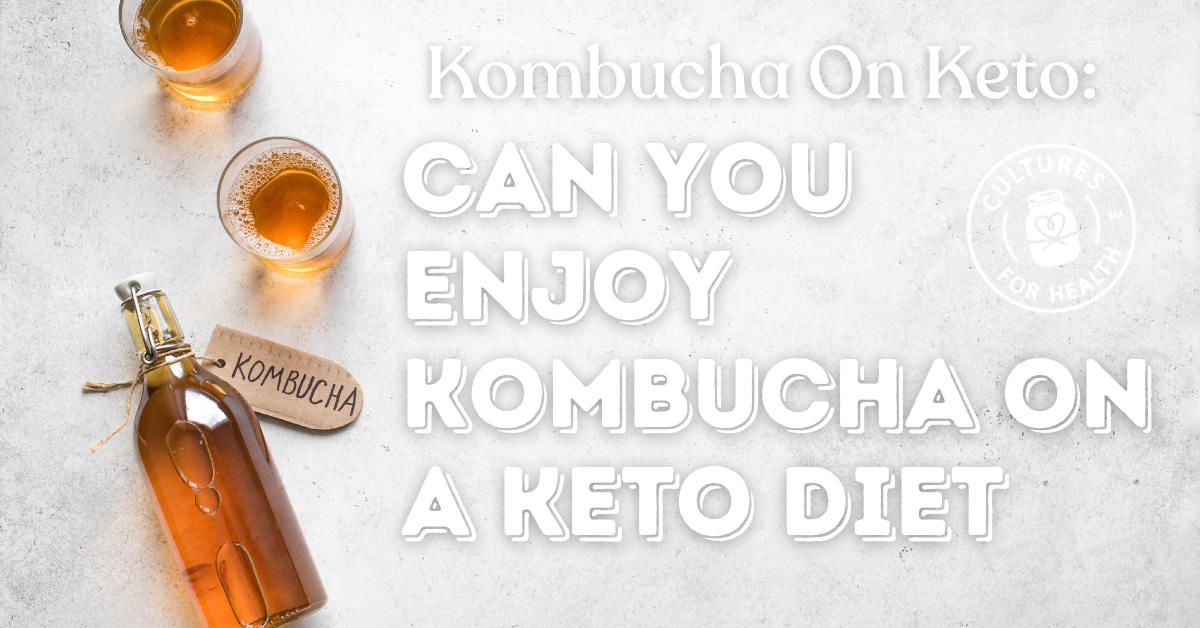
Kombucha has become a go-to drink for those looking for a refreshing and healthy alternative to soda or sugary drinks.
But, for folks on a keto diet, the sugar content in kombucha raises concerns about whether it can fit within their low-carb lifestyle or not. They often ask, "Can I have kombucha on my keto diet?"
Well, to address this burning question, we have compiled this easy-to-understand guide. You’ll find all your answers right here! So, let's dive in and fizz up some facts together.
Is Kombucha Keto Friendly?

The short answer is yes! While Kombucha does contain some sugar, it is still possible to fit it into your keto lifestyle with careful selection and moderation. To better understand this, let's dig deeper.
Kombucha:
Kombucha is made by fermenting sweetened black or green tea with a kombucha starter. The fermentation process creates a tangy, slightly effervescent drink that is packed with probiotics and other beneficial compounds. Some potential health benefits of kombucha include:
-
Improved digestion
-
Stronger immune system
-
Increased energy levels
-
Better gut health
-
Improved joint and liver health
-
Help manage type II diabetes
SEE RELATED: What is SCOBY?
Ketogenic Diet:
Now, let’s talk about the ketogenic diet, also known as keto.
The keto diet is a low-carb, high-fat diet that has become increasingly popular in recent years. The goal of the keto diet is to put the body into a state of ketosis, where it burns stored fat for energy instead of carbohydrates. This can lead to rapid weight loss, improved cognitive function, and other potential health benefits.
Simply put, to follow a keto diet, you need to limit your carbohydrate intake to 50 grams or less per day and increase your fat consumption.
There are several versions of the ketogenic diet, and here are a few:
1. Standard Ketogenic Diet (SKD):
This is the most common ketogenic diet. In this diet plan, you eat only a small amount of carbs, about 20-50 grams per day. The macronutrient breakdown for this diet is usually around 70%-75% fat, 20% protein, and 5%-10% carbohydrates.
2. Cyclical Ketogenic Diet (CKD):
This diet involves cycling between periods of low-carb, high-fat eating and periods of higher-carb intake. Simply put, you'll follow the SKD for around 5-6 days and then have 1-2 days where you can eat more carbs.
3. Targeted Ketogenic Diet (TKD):
This diet plan allows you to have a small amount of carbs around workout times. This gives you energy for exercise while still keeping you in a state of ketosis for the rest of the day.
4. High-Protein Ketogenic Diet (HPKD):
Lastly, there's the High-Protein Ketogenic Diet. It's similar to the SKD, but you eat more protein in this plan. The macronutrient breakdown for this diet is usually around 60-65% fat, 30% protein, and 5-10% carbs.
So How Do Kombucha and Keto Go Together?
Kombucha is a fermented drink that is typically made with sugar. But, for keto-dieters, this can be problematic because sugar is high in carbs.
The sugar feeds the SCOBY during the fermentation process and is partially consumed by the bacteria and yeast. But there is still some residual sugar left in the final product.
Therefore, you need to be smart about how you incorporate kombucha into your keto diet to avoid spiking your insulin levels and potentially kicking yourself out of the state of ketosis.
Tips for Enjoying Kombucha on a Keto Diet
Here are some tips for enjoying kombucha while staying in ketosis:
Choose Low-Carb Kombucha:
Opt for plain or unflavored kombucha with low carb content. Avoid varieties with added fruits or sweeteners that may elevate the sugar content.
Adjust Kombucha Intake Based on Your Ketogenic Diet Plan:
The type of ketogenic diet you're following can significantly impact how you incorporate kombucha into your diet. For instance:
-
If you're following a Targeted Ketogenic Diet (TKD), which allows for extra carbs around workout times, you could enjoy your kombucha before or after exercise to provide your body with quick energy without disturbing your state of ketosis.
-
And if you're on a Cyclical Ketogenic Diet (CKD), which involves higher-carb refeeds, kombucha can be enjoyed during the high-carb days.
Limit Your Portion Sizes:
Even low-carb kombucha can add up if you drink it in large amounts. Thus, drinking a full bottle of kombucha may not be the best choice if you're following a strict keto diet. Instead, stick to a serving size of about 6-8 ounces per day.
SEE RELATED: How Often You Should Drink Kombucha?
Check the Nutritional Labels:
If you're purchasing kombucha from a store, read the nutritional labels carefully to ensure that it aligns with your keto goals. Look out for added sugars, artificial sweeteners, and high-carb fruits like mango or pineapple. Strictly avoid brands that don't provide transparent information on sugar and carbohydrate content.
Make Your Own Kombucha:
The best way to ensure your kombucha is keto-friendly is by making it yourself. You can control the sugar content and the fermentation length. Plus, it's the most cost-effective way to enjoy kombucha for life!
Limitations of Commercial Kombucha for Keto Dieters
Now, here is a problem: Commercially available keto-friendly kombucha has its limitations. Here are some of the major ones:
Taste and Quality:
Kombucha is typically sour due to the fermentation process it undergoes. While some people enjoy this unique flavor, others may find it too strong or unpalatable. That's why companies add things like fruits or other sweet additives during the second fermentation to make kombucha taste better.
But, this approach becomes problematic for keto kombucha, which is designed to be less sweet to maintain a low carb count. Thus, to improve low-sugar, low-carb kombucha flavor, companies often resort to using artificial sweeteners. These sweeteners provide the desired sweetness without piling on the carbs.
But, research has shown that excessive consumption of artificial sweeteners may actually be harmful to some people. Some potential side effects of artificial sweeteners include an unhealthy gut, poor blood sugar control, headaches, weight gain, etc.
Availability and Cost:
Commercial keto-friendly kombucha may not be as widely available as regular kombucha. So, it might be more challenging to find them in local stores or on shelves.
Additionally, keto kombucha may be slightly more expensive than regular kombucha due to the special processing or ingredients required to lower the carbs content.
Endless Live Black Tea Kombucha Starter Culture
The Benefits of Homemade Kombucha for Keto Dieters
Making your own kombucha at home is a great option for keto dieters. It can provide you with several benefits:
Control Over Sugar Content:
One of the primary concerns for keto dieters is the sugar content in food and beverages. By making your own kombucha at home, you have complete control over the ingredients, including sugar.
You can also decide the length of fermentation time. By extending the fermentation period, you can ensure that most of the sugar is consumed, resulting in a lower-carb drink.
Cost-Effective:
Buying kombucha from stores can be expensive, especially if you consume it regularly. Making it at home can significantly save you money in the long run. All you need are the initial ingredients, a few pieces of equipment, and a SCOBY, which you can reuse for many batches.
Freshness:
When you brew kombucha at home, you can ensure its freshness. Store-bought kombucha may have been sitting on the shelves for a while, losing some of its beneficial properties over time. By brewing your own, you can enjoy the full potential of the probiotics, enzymes, and antioxidants that kombucha offers.
Avoid Additives:
Many commercial keto-friendly or low-carb kombuchas have artificial sweeteners and preservatives to enhance their taste and shelf life. By creating your own kombucha, you can have the freedom to choose natural and keto-friendly ingredients, keeping your beverage wholesome and clean.
Customization:
Lastly, making kombucha at home also allows you to get creative and customize the flavors to your liking. You can experiment with various herbal teas and spices to create unique combinations that suit your taste preferences. This level of customization ensures that you'll never get bored of your kombucha and can enjoy different flavors throughout your keto journey.
Key Takeaways: Is Kombucha Keto Friendly?
-
Yes, you can enjoy kombucha on keto! Just be smart about it.
-
Depending on your keto style, you can have kombucha at specific times.
-
Go for low-carb kombucha and keep portions small, around 6-8 ounces.
-
Commercial keto kombucha may have artificial sweeteners and can cost more.
-
Making your own kombucha at home is a great option for keto dieters! It is cheaper, healthier, and allows you to customize it according to your preferences.













